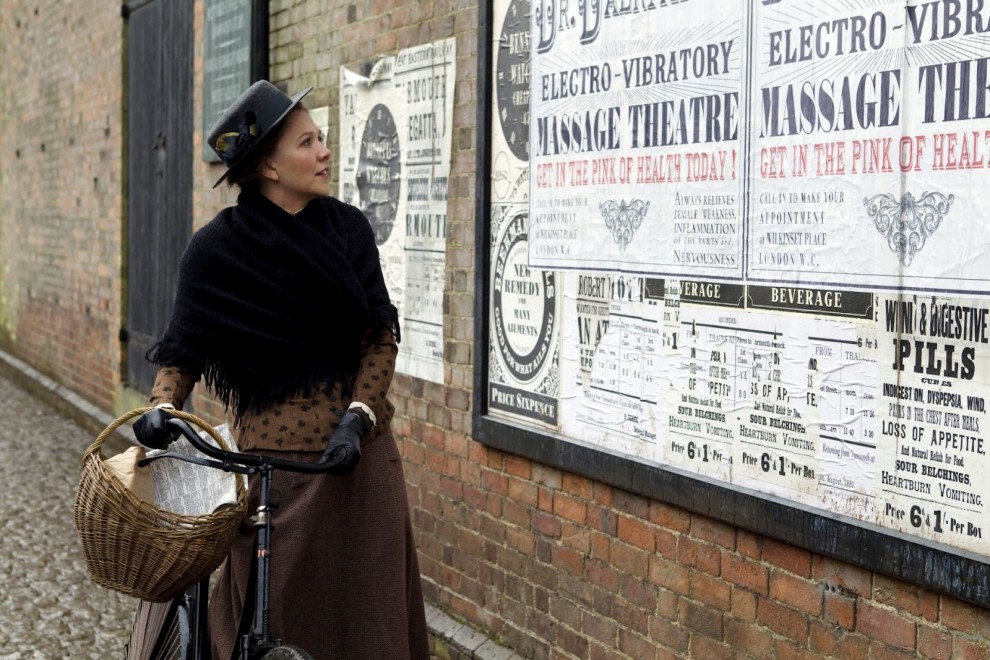Hysteria Full Movie In English
Blue Lagoon: The Awakening(Lifetime, Saturday at 8 p. ET) is the fifth screen adaptation of Henry De Vere Stacpoole's 1. In the book, as in the famous 1. Brooke Shields and Christopher Atkins, the protagonists are cousins Emmeline and Richard Lestrange. Shipwrecked in the South Pacific as children, they make like Robinson Crusoe and his girl Friday; surviving into adolescence, they make like unsupervised teenagers.
In the original, Emmeline and Richard satisfy their erotic curiosity below a monolithic statue, one of those impassive Easter Island types: "At his base, in his shadow, looking as if under his protection, lay two human beings, naked, clasped in each other's arms, and fast asleep. One could scarcely pity his vigil, had it been marked sometimes through the years by such an incident as this. The thing had been conducted just as the birds conduct their love affairs. An affair absolutely natural, absolutely blameless, and without sin."Clearly, BL: TA, a Lifetime original, doesn't want too much to do with all of that. The movie, less than sensational, prudently tempers the story's most sensational material.
Who wants the headache? Who needs the hassle if you're working at Lifetime's level—outside of genre fantasy, below rigorous artistry? Producing a light entertainment about underage incest is clearly more trouble than it's worth. Here, the protagonists are not cousins living in an earlier century, just attractive schoolmates whose boat party goes awry, stranding them in a photo shoot for Hollister.
- Directed by Rene Daalder. With Patrick McGoohan, Amanda Plummer, Michael Maloney, Joanne Vannicola. The inmates of an insane asylum are subjected to experiments using.
- Two teens, an island, and some strategically placed palm fronds: Blue Lagoon returns!
- Directed by Tanya Wexler. With Maggie Gyllenhaal, Hugh Dancy, Jonathan Pryce, Felicity Jones. The truth of how Mortimer Granville devised the invention of the first.
- · · Kings of Horror presents: The Shadows After being ship-wrecked by a near fatal collision, five friends seek refuge on a remote island in a decaying old.
- Guarda Teen Anal Hysteria 3 Part 1 full movie su xHamster.com! xHamster è il miglior sito video per il Porno Gratis!
- FRANCE: ATTACKS ON NEW RELIGIOUS MOVEMENTS. Sponsored link. Topics covered in this essay.
An actor (often actress for females; see terminology) is a person who portrays a character in a performance. The actor performs "in the flesh" in the traditional.

Emma Robinson (played by Indiana Evans) is a dimple in a prissy chin below eyes of honor- roll liveliness. Watch Jessabelle Online Free HD. Dean Mc. Mullen (Brenton Thwaites) is a bad boy and a new kid: "I heard he got kicked out of the last school he was in." (In terms of Breakfast Club membership, she is a straight- up Molly Ringwald, while he is a chuck steak seasoned with hints of Judd Nelson's defiance and Emilio Estevez's athleticism, and also a saffron- y touch of Ally Sheedy's slackerly strangeness.) She has a mother played by Denise Richards. He has a rich and withholding father but compensates with full wavy hair. Dean cuts quite an insouciant figure in the lunchroom, where he idly plays with a priapic jackknife and props his Chuck Taylors on a cafeteria chair. Where earlier lagoon- maroons have explored Melanesia, our new heroes go astray in the Caribbean, much to the relief of the production's accountants.

While doing a Habitat for Humanity- type deal in Trinidad, Emma and Dean join a flock of students sneaking off to a cruise—red Solo cups, blue Carnival feathers, a three- hour- tour. There is a raid, and a run for it, and a misadventure in a dinghy.

Soon, within the show, cable news is frantic with hysteria about teens lost at sea, as if the ticker is crawling with sharks or underlining the way that Lifetime is braiding a patented girl- in- peril tale with a mother- in- pursuit quest. The eyes of Denise Richards well with tears beneath a canopy of mascara as she resolves never to quit searching for her daughter. The eyes of Denise Richards plead for the assistance of Christopher Atkins, who makes a cameo as a high- school teacher and wears a look of avuncular concern, as opposed to what he wore in the 1.
Marc Cerrone (born 1952 in Vitry-sur-Seine, near Paris, France) is a French disco drummer, composer, record producer and creator of major concert shows. Watch When Daddys Gone - XXX Full Movie video on xHamster, the greatest sex tube site with tons of free Pussy Fucking Oral & Fucking porn movies!

Meanwhile, Emma and Dean wash up in the new Eden. Amid squabbles and flirting, they learn to fend for themselves in the wild. Offscreen, apparently, Emma discovers a Sephora that will sell her pink lip gloss while Dean frequents a nearby body- waxing salon. As a reward for their good grooming in the face of mortal peril, the characters get to have sex.
One depiction of intercourse finds the camera peering at innocent skin through a gap in some strategically placed palm fronds. It's as if we're snooping—the implicit creepiness of which dents the effort at decency. The actors playing the BL: TA duo are healthy and wholesome, if not terribly expressive; perhaps the matter is that both are Australian, and it's all they can do to keep their accents under control. Or maybe it's that both are fluent in English, and it's all they can do to keep from cracking while reading their dialogue. Perhaps the performers are waterlogged: Emma and Dean spend a lot of time caressing in the plunge pool of a waterfall, and they spend an eternity rolling in the spume of surf. Should we feel guilty?" Emma wonders, in a sudden pout of introspection. About the fornication?
No, that's absolutely natural, absolutely blameless. But you kids should be ashamed of the moment where Dean, as if in accordance with a tribal mating ritual, declares the constancy of his love while standing out in the rain.
Actor - Wikipedia. An actor (often actress for females; see terminology) is a person who portrays a character in a performance. The actor performs "in the flesh" in the traditional medium of the theatre, or in modern mediums such as film, radio, and television. The analogous Greek term is ὑποκριτής (hupokritḗs), literally "one who answers".[1] The actor's interpretation of their role pertains to the role played, whether based on a real person or fictional character.
Interpretation occurs even when the actor is "playing themselves", as in some forms of experimental performance art, or, more commonly; to act, is to create, a character in performance.[2]Formerly, in some societies, only men could become actors, and women's roles were generally played by men or boys.[3][when?] When used for the stage, women occasionally played the roles of prepubescent boys.[4][when?]Terminology[edit]After 1. England, when women first started to appear on stage, the terms actor or actress were initially used interchangeably for female performers, but later, influenced by the French actrice, actress became the commonly used term for women in theatre and film. The etymology is a simple derivation from actor with ess added.[5] However, when referring to groups of performers of both sexes, actors is preferred.[6]Actor is also used before the full name of a performer as a gender- specific term.
Within the profession, the re- adoption of the neutral term dates to the 1. When the Observer and the Guardian published their new joint style guide in 2. Use ["actor"] for both male and female actors; do not use actress except when in name of award, e. Oscar for best actress." [6] The authors of the style guide stated that "actress comes into the same category as authoress, comedienne, manageress, 'lady doctor', 'male nurse' and similar obsolete terms that date from a time when professions were largely the preserve of one sex (usually men). As Whoopi Goldberg put it in an interview with the paper: 'An actress can only play a woman. I'm an actor – I can play anything.'"[6] The U.
K. performers' union Equity has no policy on the use of "actor" or "actress". An Equity spokesperson said that the union does not believe that there is a consensus on the matter and stated that the ".. In 2. 00. 9, the Los Angeles Times stated that "Actress" remains the common term used in major acting awards given to female recipients[8] (e. Academy Award for Best Actress). With regard to the cinema of the United States, the gender- neutral term "player" was common in film in the silent film era and the early days of the Motion Picture Production Code, but in the 2.
However, "player" remains in use in the theatre, often incorporated into the name of a theatre group or company, such as the American Players, the East West Players, etc. Also, actors in improvisational theatre may be referred to as "players".[9]History[edit]The first recorded case of a performing actor occurred in 5. BC (though the changes in calendar over the years make it hard to determine exactly) when the Greek performer Thespis stepped onto the stage at the Theatre Dionysus to become the first known person to speak words as a character in a play or story. Prior to Thespis' act, Grecian stories were only expressed in song, dance, and in third person narrative. In honor of Thespis, actors are commonly called Thespians. The exclusively male actors in the theatre of ancient Greece performed in three types of drama: tragedy, comedy, and the satyr play.[1.
Western theatre developed and expanded considerably under the Romans. The theatre of ancient Rome was a thriving and diverse art form, ranging from festival performances of street theatre, nude dancing, and acrobatics, to the staging of situation comedies, to high- style, verbally elaborate tragedies. As the Western Roman Empire fell into decay through the 4th and 5th centuries, the seat of Roman power shifted to Constantinople and the Byzantine Empire. Records show that mime, pantomime, scenes or recitations from tragedies and comedies, dances, and other entertainments were very popular. From the 5th century, Western Europe was plunged into a period of general disorder.
Small nomadic bands of actors traveled around Europe throughout the period, performing wherever they could find an audience; there is no evidence that they produced anything but crude scenes.[1. Traditionally, actors were not of high status; therefore, in the Early Middle Ages, traveling acting troupes were often viewed with distrust. Early Middle Ages actors were denounced by the Church during the Dark Ages, as they were viewed as dangerous, immoral, and pagan. In many parts of Europe, traditional beliefs of the region and time period meant actors could not receive a Christian burial. In the Early Middle Ages, churches in Europe began staging dramatized versions of biblical events. By the middle of the 1.
Russia to Scandinavia to Italy. The Feast of Fools encouraged the development of comedy. In the Late Middle Ages, plays were produced in 1. These vernacular Mystery plays often contained comedy, with actors playing devils, villains, and clowns.[1. The majority of actors in these plays were drawn from the local population. Amateur performers in England were exclusively male, but other countries had female performers. There were a number of secular plays staged in the Middle Ages, the earliest of which is The Play of the Greenwood by Adam de la Halle in 1.
It contains satirical scenes and folk material such as faeries and other supernatural occurrences. Farces also rose dramatically in popularity after the 1. At the end of the Late Middle Ages, professional actors began to appear in England and Europe. Richard III and Henry VII both maintained small companies of professional actors. Beginning in the mid- 1. Commedia dell'arte troupes performed lively improvisational playlets across Europe for centuries. Commedia dell'arte was an actor- centred theatre, requiring little scenery and very few props.
Plays were loose frameworks that provided situations, complications, and outcome of the action, around which the actors improvised. The plays utilised stock characters.
A troupe typically consisted of 1. Most actors were paid a share of the play's profits roughly equivalent to the sizes of their roles. Gettin` It Full Movie.
Renaissance theatre derived from several medieval theatre traditions, such as the mystery plays, "morality plays", and the "university drama" that attempted to recreate Athenian tragedy. The Italian tradition of Commedia dell'arte, as well as the elaborate masques frequently presented at court, also contributed to the shaping of public theatre. Since before the reign of Elizabeth I, companies of players were attached to households of leading aristocrats and performed seasonally in various locations. These became the foundation for the professional players that performed on the Elizabethan stage. The development of the theatre and opportunities for acting ceased when Puritan opposition to the stage banned the performance of all plays within London. Puritans viewed the theatre as immoral. The re- opening of the theatres in 1.
English drama. English comedies written and performed in the Restoration period from 1. Restoration comedy". Restoration comedy is notorious for its sexual explicitness. At this point, women were allowed for the first time to appear on the English stage, exclusively in female roles.
